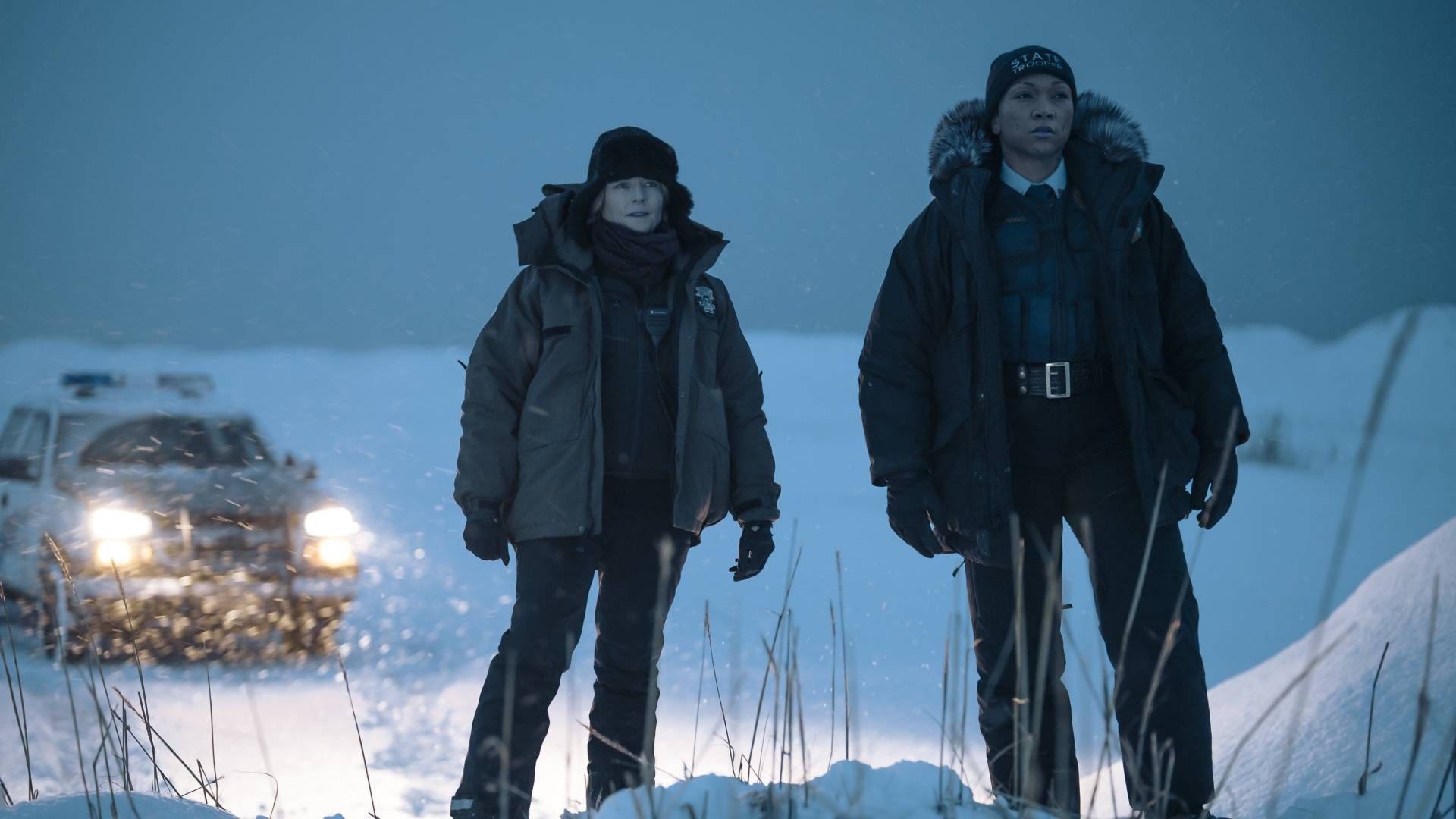
"What's hidden in the snow will come forth in the thaw", claims an old Swedish proverb – a motto that could certainly apply to the season finale of Alaska-set True Detective: Night Country. In the bleak, beautiful last episode of the crime drama's fourth season, bombshell truths were uncovered – and concealed yet again – as Liz Danvers (Jodie Foster) and Evangeline Navarro (Kali Reis) finally learned who killed Annie K, and what really happened that fateful night at the Tsalal Arctic Research Station.
Or did they? Given the show's spiritual and supernatural elements, things might not be quite as simple as that, Reis and writer-director Issa López tease in an exclusive interview with GamesRadar+. Below, the duo run through some of episode 6's most memorable moments, from Danvers' fireside outburst at Navarro and the spiral symbol's origins' reveal to that surprise "confession"...
Of course, it should go without saying that the below conversation is filled with *major spoilers* for True Detective season 4, so if you've yet to finish the series, turn back now. Let's dive in...
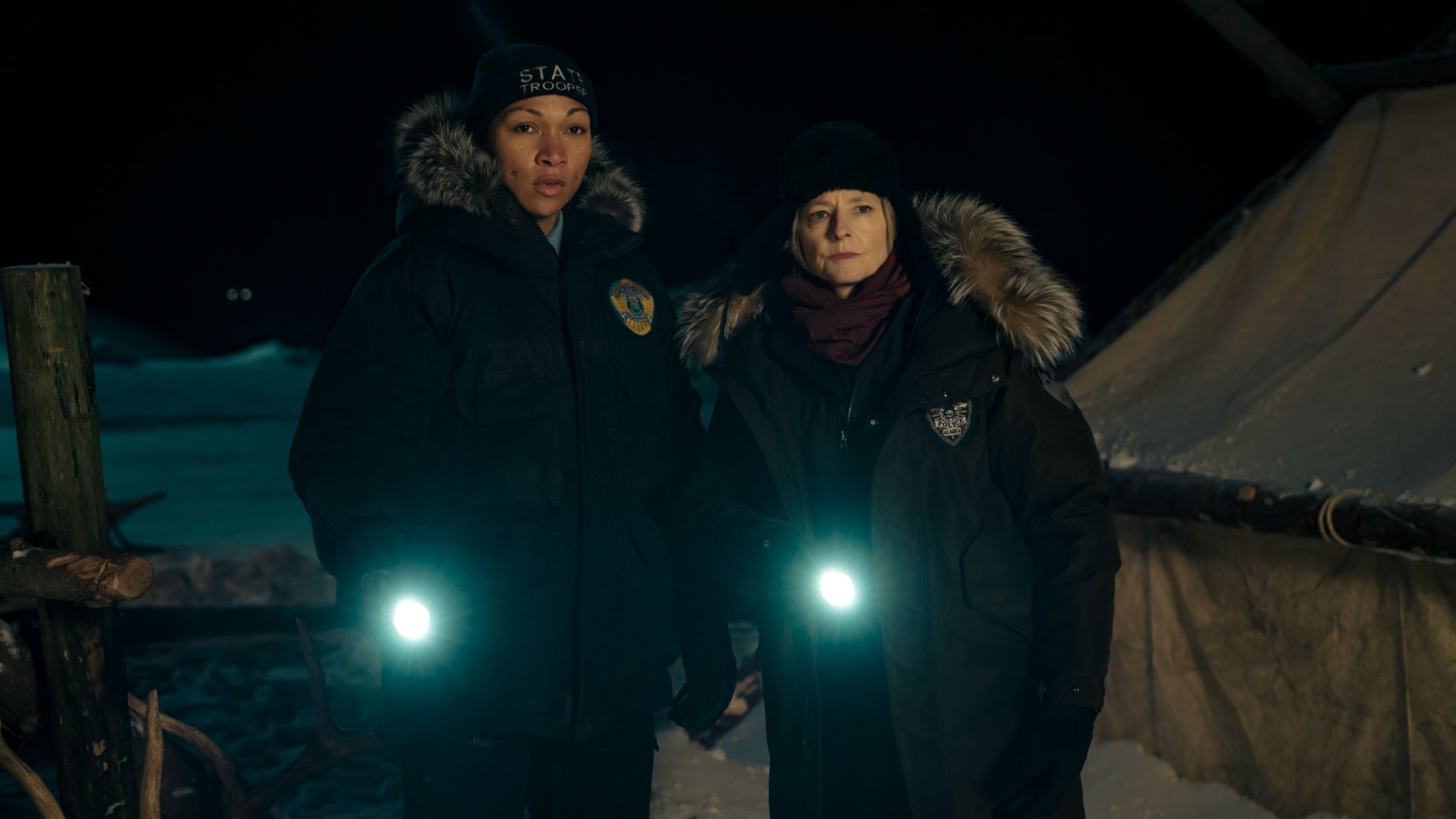
GR: The reveal is so powerful and makes so much sense with the show's themes, yet, I've got to admit, I never saw it coming. I'm curious as to whether you had the conclusion in mind before you even put pen to paper or did you come to it more organically during the writing process?
Issa López: When you start writing a murder mystery, you'd better know who the killer is... Otherwise, you're going to twist something to make it work. You know how the crime is exposed at the very beginning, and what you need to discover is what your detectives need to discover to get to the end. The rest is just filled-in blanks, and filling in the blanks is fun!
Kali, what did you think when you read it in the script for the first time?
Kali Reis: First of all, I didn't see it coming. It was one of those things where I read it, and then went back a few pages like, 'Wait a minute, wait a minute… this is huge'. I was really happy to see, especially as an indigenous woman, to see these women come together as a community, as the "invisible people" of this entire story, in search of justice. I was just like, "Yes! I can hear all the aunties screaming!", like yeah, it was such a revelation. It also leaves a little bit of mystery, too, because we get the logic and we have our answers, but you don't have all of them and you still don't know really, truly know what happened to those men.
Issa, I know you've spoken before about how the public perception of law enforcement has changed dramatically since the first season aired back in 2014. The ending really feels like a response to that, when Danvers and Navarro choose to keep the women's "confession" to themselves.
López: There's no fun in areas that aren’t a little grey, right? But even the first season – before we had that massive cultural shift of perception, our relationship with the police after George Floyd changed – did a pretty good job of talking about police corruption and the selective justice that is applied in some cases. You have to give it to them. That said, my favorite type of detective stories are the ones where the detective finds who the killer is and decides to walk away.
The finale is as much about Navarro embracing her Iñupiat culture and finding herself as it is about discovering what really happened to Annie and the scientists. Kali, what was that like to explore?
Reis: It was something I didn't really have to explore because it was something so personal. Navarro needed to hear all that in order to move forward, whatever her choice was. So when I saw what her name was, and what it meant, and where the actual name came from, it's just brought everything so full circle. Finally finding out what happened to Annie gave her a sense of closure; she closed all the doors that needed to be closed so she can walk through new ones and take that step forward. I mean, even thinking about it now, it's just very, very personal to me. So it was an easy, easy relation.
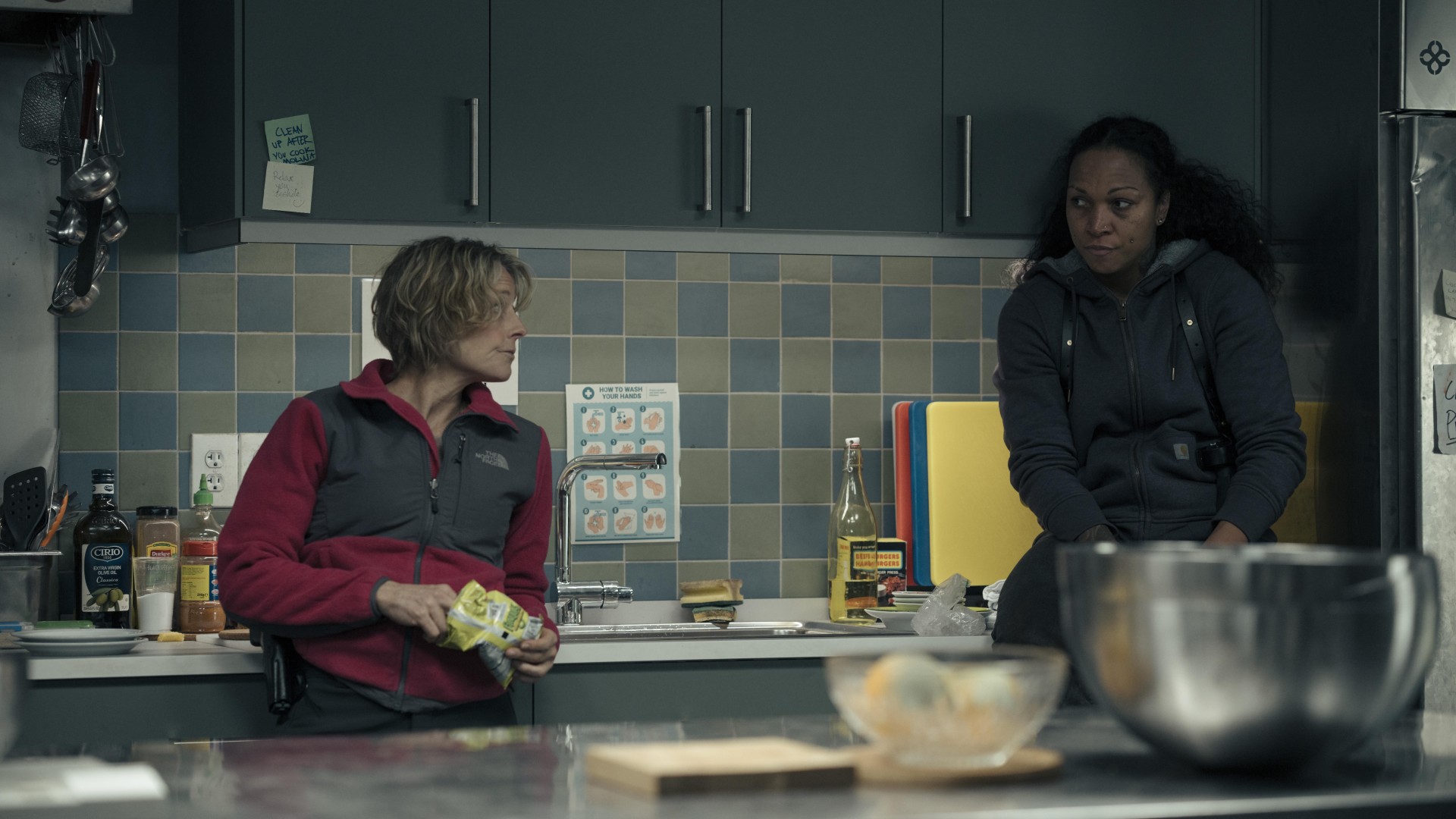
Night Country has been compared to The Thing a lot due to its snowy setting and more supernatural elements, but Part 6 is definitely the most Thing-esque installment. Did you look at it for inspiration?
López: Oh, absolutely. In the writing process, I went back and watched Seven and Silence of the Lambs. I watched The Thing, I watched Sicario, I definitely watched the first season a bunch of times. I watched noir movies. It was in the middle of the pandemic, you know, there was a lot of time to watch stuff and feed into your obsessions. I watched The Shining by chance, because I was invited to do a podcast revising it – I went pretty in deep with that. The way the Overlook Hotel is kind of an omniscient presence became an inspiration for Tsalal, especially in episode six. And how the cameras move in The Shining became a reference on how we shot Tsalal.
There is a little bit of Alien in there, you know, the crew of the Nostromo. There are some nods to Cronenberg in the more body horror aspects of the show so yes, I see it as a nice cocktail of scary things.
Kali, how did the singular setting influence your performance?
Reis: Listen, it wasn't fair that Jodie fits in all those little areas so nicely and I was, like, hunched over *laughs*. But it added to the desperation; it felt like the walls were closing in on not just the physical place but, actually time's ticking.
It really felt like they were getting closer and closer and closer to the answer. It was fun shooting in there, I will say that, but it added to the realism of how far and how deep these women are gonna go to find the truth. You just decided to dig into an ice cave, in the middle of a storm, with no guarantee that you're gonna make it out? It solidifies how committed they were to having each other's backs and how much they trusted one another to find the answers.
López: I remember when we were shooting the scene of [Navarro] and [Danvers] breaking the hole in the ice – and Kali and Jodie actually broke a hole in natural ice. There was a hole underneath that Kali was supposed to get in, and we had all this fake arctic wind hitting them; I'm directing it and Jodie just turns to me right before I say 'action' and she yells, 'These bitches are crazy!'
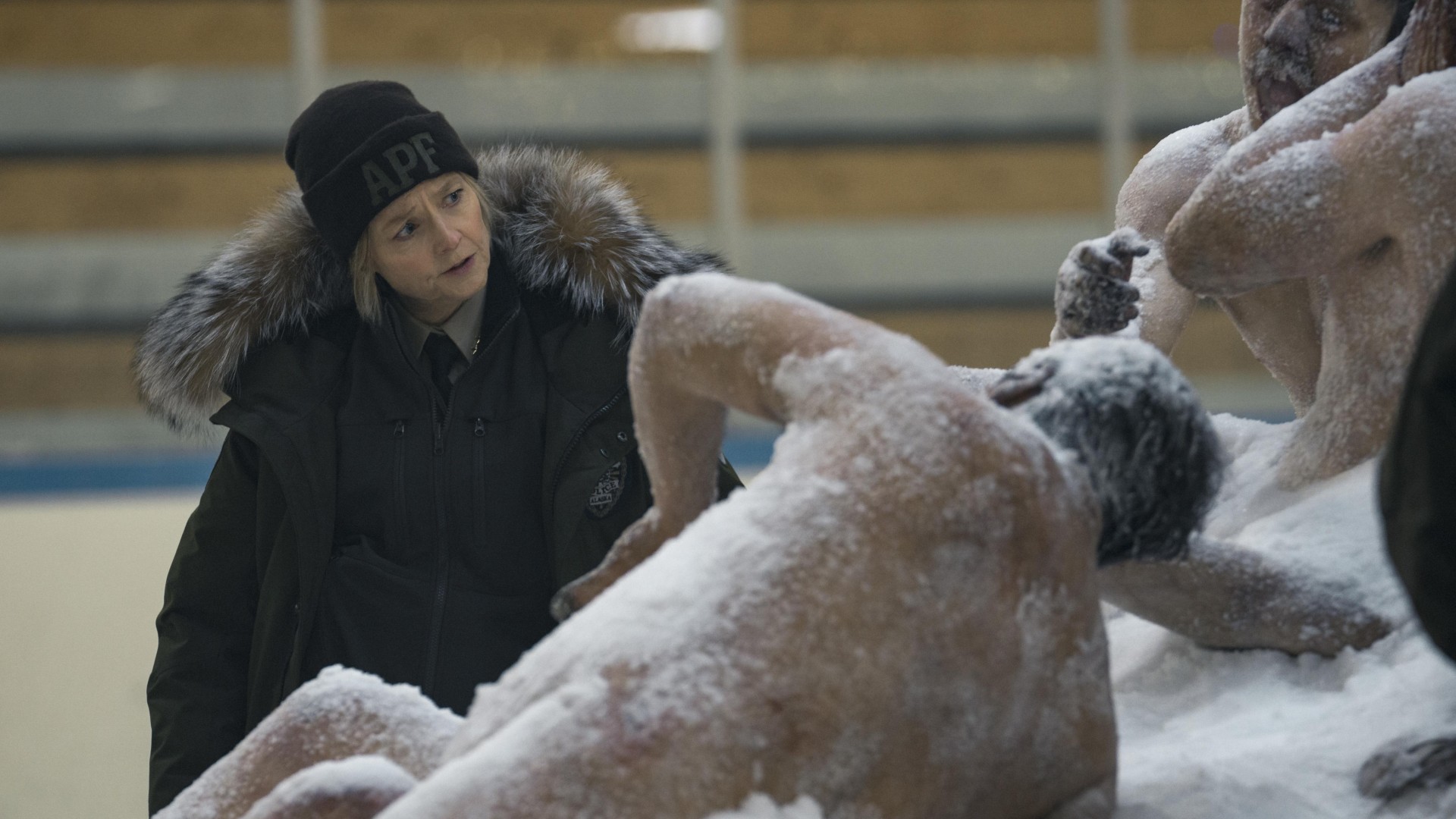
I have to ask about the emotional scene by the campfire, where Danvers lays into Navarro after she mentions her late son Holden by name. What was that like to shoot? What was it like getting ranted at by Jodie Foster?
Reis: That's one of my favorite scenes, honestly. Performance-wise, she went there. You got to finally see Danvers say what she needs to say, and Navarro is, like, holding space for her to do so. I just think that whole scene is just so powerful. It was hard to shoot, though, because it was hot but we had to pretend we were freezing cold!
It just says so much about where Navarro is; she's ready to listen. It's like, 'Okay, I have nothing else here for me and we're trying to find this.' But she's so careful with how she handles Danvers. She's just like, 'You know what? I'm just gonna say what I have to say to get it out of you because I know now this is the time'.
López: What wowed me was the layers of emotion she goes through in every single line. Every word is so full of history and meaning, and that change in register was never predictable. I couldn't tell how she was gonna deliver one line to the next line. It was truly wonderful and a privilege to be on that set that day, witnessing that.
Reis: I don't think there was a dry eye in the house.
López: We closed the set as if it was a sex scene because in a weird way, it was – it's incredibly intimate. The crew was behind walls and it was just the three of us, the DP, who was operating the camera at that point, and his first quarter. That was it. Every time Jodie would go there and every time, we would just take a second after and breathe. I'd look at Jodie and she'd go, 'Let's go again'. I think she ended up doing that scene five or so times, and it was very hard to pick between those takes.
Was there ever a version of the show that delved into what happened to Holden more?
López: I think that it's up to the audience to reconstruct whatever happened – was she there? I mean, I think that if you listen carefully to that monologue, you realize she was not there. Because she wonders, 'Was he hurt? Was he calling me and I was not there?' You know? We see her walking on the glass and arriving at the place where it happened, but the accident is over, right, it's done by the time she gets there. It happened, then she got there, and that's all we see.
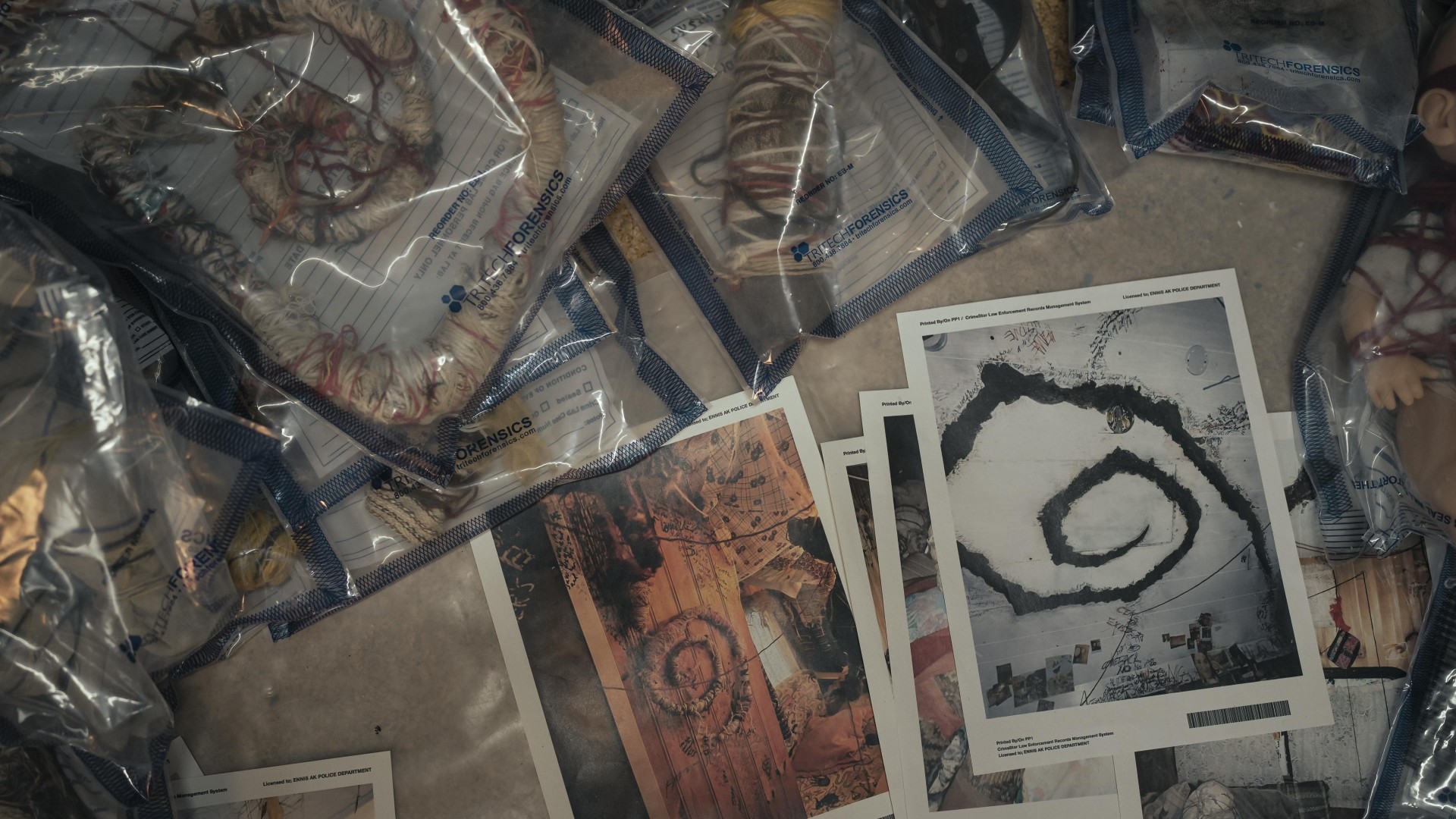
There are a lot of violent men with bad intentions in the series, but then you have characters like Pete and Qavvik, who are very sweet and always trying to do the right thing. How important was it for you to include men like that in this narrative?
López: It was vital. We're not saying that men are evil in this series. That's not what it is about at all. Navarro and Danvers are not good people; they're not. They will end up making the right decisions but they've made bad decisions in their lives. And it was very, very important to me to have at least two men that just made good decisions. They're decent human beings, and sometimes the good decision seems like the only possible decision at a certain point.
The finale reveals the origin of the spiral symbol – the bones in the ice – of sorts, and it's trippy, because Annie had a tattoo of that same symbol long before she made it down into that bunker lab. What does the spiral mean to you?
López: In episode 3, it's established that Annie, when she was in high school, she started having dreams about the spiral, and the dreams wouldn't stop until she got the tattoo. Is it all by chance? Because that can be an explanation, you know? It's a more rational, Danvers-style explanation. I have a spiral tattoo myself and I got it way before I saw True Detective.
Or is it what Clark is saying? Is there a spirit that sleeps in the night country? Those animals froze and fossilized eons ago, and their presence, that has been sleeping there, was disturbed by these men. Her physical manifestation is Annie, and she doesn't know it, and she's condemned to repeat that forever, you know? The sleeping woman, woken up by the evil deeds of humanity. We're trapped in that circle of time.
Do you think Annie really killed the scientists? Them dying from the cold doesn't necessarily explain their terrified faces...
López: Well, Danvers would say, 'It's called hypothermia delirium.' It causes visions and panic, and voila, corpsicle! Or, did they really face the entity that they woke up? It's your decision. They dug in her house... they killed her daughter... and she came for them – and she ate their fucking souls.
Reis: … and spit out their frozen bones.
True Detective: Night Country is streaming now on Sky and NOW in the UK, and Max in the US. For more, check out our picks of the most exciting new TV shows heading our way.







